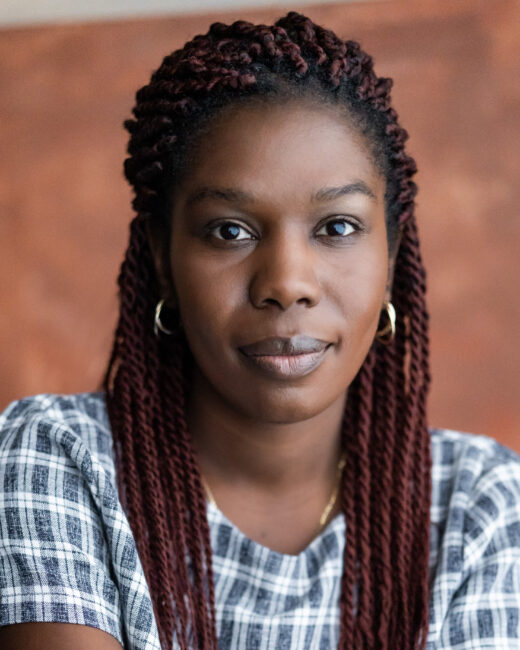Name: Teresa Senyah
Job Title: Product Developer for Maths Qualifications
Organisation: Pearson
Number of years in current position: 9 months
Qualifications: MA in Mathematics Education and PGCE in Maths from Kings College London and a BSc Hons in Mathematics (1st class) from the University of Birmingham.

Briefly describe the organisation you work for.
Pearson is the UK’s largest awarding organisation offering academic, vocational, and work-based learning qualifications.
Explain what you do on an average day at work.
It sounds like a cliché, but every day is different! The main purpose of my role is to supporting teachers and learners through the lifecycle of Level 2 & 3 Mathematics qualifications and also developing or re-developing Mathematics qualifications. This includes managing that process until their ‘First teach’ and working closely with an extensive number of teams across the business, like assessment design, examining teams, IT, operations, sales and marketing.
A typical day consists of meetings with internal and external stakeholders to coordinate how best to support our customers. Some days I may be creating Mathematics resources, for others, I may be project managing long-term initiatives or attending/presenting key events to represent the Pearson Maths team. There’s always something new happening so it keeps me on my toes!
What do you like most about your job?
I co-host the Pearson Maths podcast ‘The Right Angle’ where I am able to interview incredible guests who have contributed greatly to Mathematics and Mathematics Education. I am always interested in talking about Mathematics, what it looks like in schools for different students, the different pathways it can open up and how fun it can be! So far, I have spoken to Rob Eastaway, Professor Nira Chamberlain OBE and Dr Thomas Hunt with more really exciting guests coming up in the next few months.
What stimulated your interest in maths, and when?
I always loved Maths, ever since primary school. I liked how logical it was, how it challenged me but also how creative it can be when there are multiple methods that you can use to solve problems. I also had some wonderful teachers at my school who saw something in me and believed that I could pursue Mathematics beyond GCSE and A level. Alongside my parents and family, they really supported me studying Mathematics at university and I’m so glad that I did. After university, I decided to become a Mathematics teacher with the goal of making Maths accessible and engaging for everyone I taught. No matter what attainment level students may start at, I wanted everyone to conceptually understand Mathematics, make personal progress and hopefully love it as much as I did. That enthusiasm for Education is what drove me to apply for my current role.
What influenced your career choice?
I’ve always had a variety of interests which go beyond Mathematics like Drama, Performing Arts, History and more. I wanted a career that could incorporate these different elements and Education was a great place for them to crossover. Drama and Mathematics may seem like they are worlds apart but whether you are standing in front of a class teaching, giving a presentation on research findings or being innovative, both disciplines provide skills which are integral for success.
Which skills do you consider to be essential for your job?
There are many key skills which are essential for being a Product Developer and I’ve highlighted four below.
- Leadership – In this role you lead multiple projects, and it is critical that you have clear leadership skills to ensure the projects are successful as you may have to coordinate with many people across the span of the business. You have to lead the timeline for delivery and set out a clear strategy for completion.
- Creative and Flexible – Sometimes things do not go to plan, so you need to be flexible and adaptable to react to any potential issues that arise. You have to think creatively on how to solve issues in different ways.
- Organised – There are many different projects and initiatives that you will be leading or contributing to which will be happening at the same time. You must be organised and be able to prioritise your time effectively so that you can keep on top of everything.
- Listening – One of the most important parts of my role is having a customer-first outlook. This means it is necessary to listen to what the customer wants and needs from the product over its lifecycle and cater to those needs as much as possible, whilst in keeping with the overall strategic plan and budget.
Any advice you may have for other individuals considering your career path?
- If you would like to study Mathematics at university, I’d say it is important to secure a strong A level result in the subject and I would recommend studying A level Further Maths if your school offers it. This is not to say that you can’t study Maths without these two things, but it will make the transition between your A levels and degree easier as you will have greater exposure to a variety of mathematical concepts.
- Once studying Mathematics at university, always remember that no matter how challenging it can get, you can do it, so keep trying! There are demanding moments for everyone, the way you overcome them is what will define your achievement.
- I then moved onto Mathematics Education because I had a genuine interest in how Maths was taught, and how it was perceived by many in our wider society. If you are looking to pursue a career in teaching, my advice when training is to observe the experienced teachers, see how they make their lessons outstanding, make notes and then borrow the good bits. Being a teacher is not about trying to be perfect. Bring your own personality and expertise into the room and take the time to build great relationships with your students. For me, those qualities, along with trying to make my Maths lessons as engaging as possible contributed greatly to my progression into leadership positions like the Head of Maths and Curriculum Director of Mathematics.
- The last stop on my career journey so far is in qualification development. If you have an interest, I’d suggest researching the different exam boards, qualification providers and institutions to see what types of qualifications you’d like to develop and what part of the process you would like to be involved in. There are many different facets to developing qualifications so keep an open mind.
Your future career plans?
I am interested in continuing with qualification and assessment development in a broader setting and using my experience to inform future learning.






